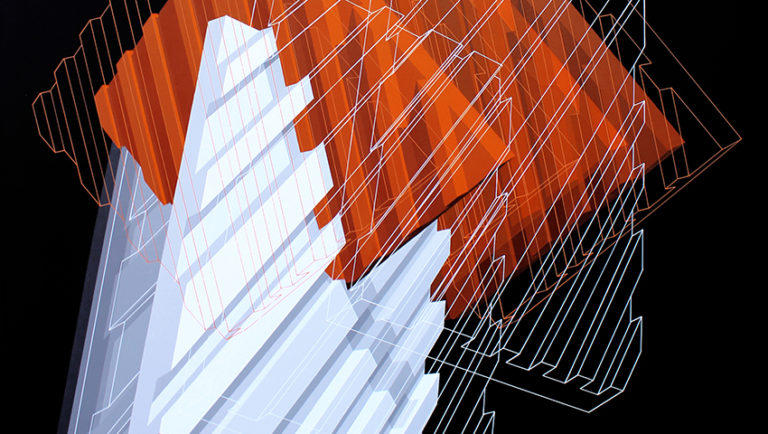8/2 – 10/4 2018
ONEstudio | Valencia | España
Generación tras generación, en el contexto valenciano, el CONSTRCUTIVISMO, en sus diversas manifestaciones plásticas, ha seguido en pleno desarrollo, sirviendo como un determinado enlace entre el siglo XX y el actual. Tampoco ahora faltan destacados representantes, entre las nuevas generaciones, que postulan un sello propio para su quehacer artístico.
De hecho, el Constructivismo de Carolina Valls es, sin duda, uno de los más característicos, potentes y diferenciados. Ha sabido correlacionar, con suma habilidad, cálculo e intuición, la fuerza geométrica de sus propuestas, con un singular tratamiento del espacio, a la vez que sus estructuras van definiendo formas y volúmenes, tensiones dinámicas y contrastes cromáticos.
Al haber conseguido la estabilización de su “poética” (su concepto de arte y su personal programa de intervención), cabe reconocer que su lenguaje pictórico ha devenido emblemático en la consolidación de su trayectoria, cada vez con más reconocimientos y respaldos externos.
Creatividad y profesionalización no son nociones opuestas. De ahí que sus investigaciones y experiencias pictóricas se entronquen, justamente, en ambas vertientes, postulando la innovación, en cada proyecto y enfatizando, además, el buen hacer en un creciente y satisfactorio perfeccionismo.
Román de la Calle
Generation after generation, in the Valencian context, CONSTRUCTIVISM, in its diverse plastic manifestations, has continued in full development, serving as a specific link between the 20th century and the current one. Nowadays, there isn’t a lack of representatives which stand out either; among the new generations, who mark their own print for their artistic work.
In fact, Carolina Valls’ Constructivism is, without doubt, one of the most characteristic, powerful and differentiated. She has managed to correlate, with great skill, calculation and intuition, the geometric strength of her proposals, with a singular treatment of space, whilst her structures define shapes and volumes, dynamic tensions and chromatic contrasts.
Having achieved the stabilization of her “poetics” (her concept of art and personal program of intervention), we must recognize that her pictorial language has become emblematic in the consolidation of her career, with more and more external recognition and support.
Creativity and professionalisation are not opposite notions. That is why her research and pictorial experiences are linked, precisely, in both aspects, putting forward innovation in each project and emphasizing, in addition, the good work in a growing and satisfactory perfectionism.
Román de la Calle
